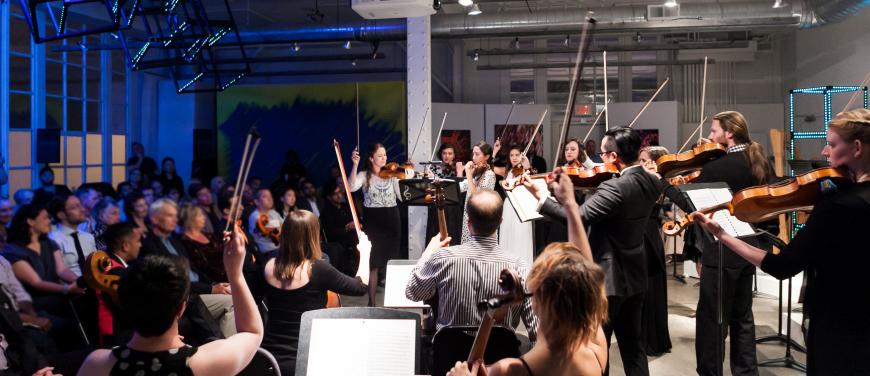
While we’ve been stewing and worrying over the continued existence of many of the smaller-budget arts groups that are so vital to the Bay Area scene, One Found Sound has been planning a season designed to put our fears to rest.
“I’ve been so heartened by the support that One Found Sound has received throughout the pandemic,” co-founder Sasha Launer wrote me.
Like so many organizations, we were forced to pivot to virtual content, and this shift actually ended up creating opportunities and creative outlets for us rather than limiting us. Our community came together for virtual watch parties, and our musicians worked with filmmaker Max Savage and local dancers and visual artists to produce creative music videos that really expanded our idea of what One Found Sound could accomplish with classical music performances. Our experiences creating virtual content inspired us to think more expansively about what an in-person concert could be, and so when we had the opportunity to plan live concerts again, we were so excited to incorporate many of the creative partnerships and visual elements that we developed during the pandemic. It has been inspiring for us as musicians, and I think it's been inspiring for our audience members as well, as we've seen support from our community increase throughout the pandemic.”
The orchestra, founded by graduates of the SF Conservatory, is preparing “Constellations,” a season of great music at their home base, Heron Arts in San Francisco’s SOMA district. The theme threading through the whole season is our relationship with the natural world.
The orchestra opens up with “Phoenix” on October 16, a concert that features Jerod Impichchaachaaha’ Tate’s Chokfi (Rabbit), a seven-minute piece originally written for a youth orchestra that the SF Symphony also included in a “Currents” program. Louise Farrenc’s imaginative and masterful Symphony No. 3 prepares the way for Jessie Montgomery’s Records of a Vanishing City (2016), a tone poem about the vibrant artistic diversity of New York City in the 1980s and 90s, when Montgomery was growing up.

Picking up from where they left off, One Found Sound is inviting artists to collaborate with them in presenting the concerts. Oct. 16’s show will feature film and light design synced to the music by filmmaker Max Savage and cinematographer Yuito Kimura.
“Helios” (Nov. 13 at Heron Arts) is a short string quartet concert in which Derrick Skye’s American Mirror shares the bill with Carlos Simon’s Warmth From Other Suns. The full orchestra is on display again in “Terra” (Dec. 11), tethered by a performance of Mozart’s Symphony No. 35, but notable for the world premiere of Ecosystem by Joel Hoo, the winner of the OFS Emerging Composer Award in 2021. Toru Takemitsu’s quietly beautiful Tree Line completes the show, which will be performed alongside “immersive, natural-themed paper sculptures created by artist Casey Curran.”
“Aurora” (Feb. 5, 2022) begins with Viet Cuong’s Thu Điếu (2017), based on a 19th-century Vietnamese poem, sung here by soprano Bích-Vân Nguyễn. Nokuthula Ngwenyama’s Primal Message for string orchestra takes inspiration from the 1974 Aricebo interstellar radio message, and the concert concludes with the witty, charming Symphony No. 8, by Ludwig van Beethoven.
On March 26, a woodwind quintet will share the stage with dancer Babatunji Johnson in a set called “Mars.” The dancer performs in Ivan Trevino’s Song Book, Vol. 3, which was originally released by OFS online in 2020. Two fantastic works complete the concert, Jeff Scott’s Homage to Duke and Paquito d’Rivera’s popular Aires tropicales.
The season winds up with a gala for the orchestra on May 21. The centerpiece work there is a new clarinet concerto, co-commissioned with the Minnesota Orchestra, by composer Mary Kouyoumdjian, with Jeff Anderle as soloist.
As if that’s not enough, OFS continues its education programs this time in collaboration with SF Parks and Recreation’s SCRAP initiative. Musicians will be working with students throughout the fall to learn the basics of sound production and rhythm, and to build their own instruments made from found objects collected by SCRAP SF. This is not an orchestra that appears to be worried about its future. Tickets to their concerts are still just $25. Here’s why we value the small groups that populate California and the rest of the world. They make innovation seem natural.






